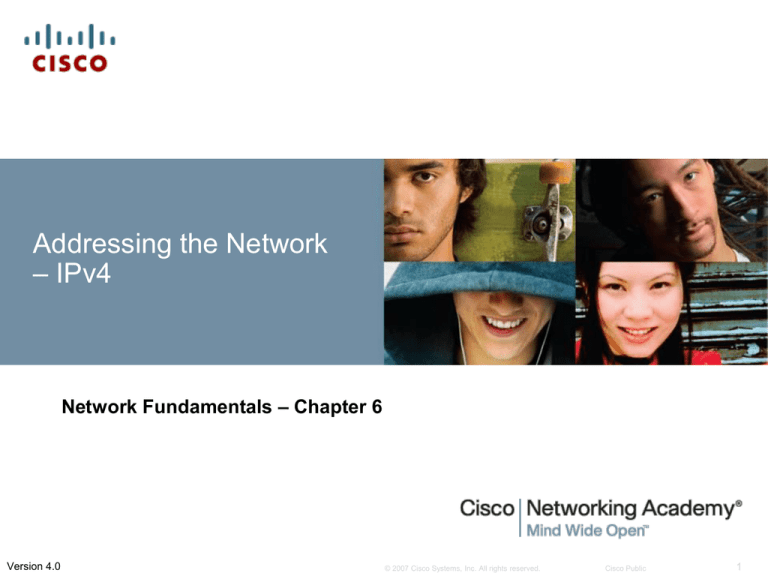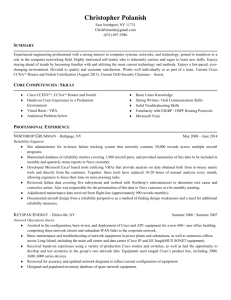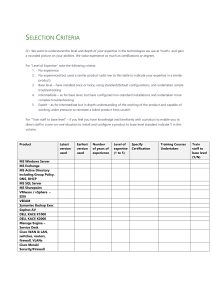
Addressing the Network
– IPv4
Network Fundamentals – Chapter 6
Version 4.0
© 2007 Cisco Systems, Inc. All rights reserved.
Cisco Public
1
IPv4 Addressing
Method for assigning addresses
© 2007 Cisco Systems, Inc. All rights reserved.
Cisco Public
2
IPv4 Addressing
Class A
•The class A address block was designed to support extremely
large networks with more than 16 million host addresses.
•Limited to 128 networks, they could only be allocated to
approximately 120 companies or organizations.
Class B
•designed to support the needs of moderate- to large-size
networks with more than 65,000 hosts
Class C
•provide addresses for small networks with a maximum of 254
hosts.
•Used a /24 prefix.
© 2007 Cisco Systems, Inc. All rights reserved.
Cisco Public
3
Assigning Addresses
The importance of using a structured process to assign
IP addresses to hosts.
•Preventing duplication of addresses
• Each host in an internetwork must have a unique address
•Providing and controlling access
• Some hosts, such as servers, provide resources to the
internal network as well as to the external network
•Monitoring security and performance
• identify the device on the network that has a problematic
address.
© 2007 Cisco Systems, Inc. All rights reserved.
Cisco Public
4
Assigning Addresses
End user devices can obtain addresses either statically
through an administrator or dynamically through DHCP
Static
With a static assignment, the network administrator must
manually configure the network information for a host. At a
minimum, this includes entering the host IP address, subnet
mask, and default gateway.
Dynamic
DHCP enables the automatic assignment of addressing
information such as IP address, subnet mask, default gateway,
and other configuration information.
The configuration of the DHCP server requires that a block of
addresses, called an address pool, be defined to be assigned to
the DHCP clients on a network.
© 2007 Cisco Systems, Inc. All rights reserved.
Cisco Public
5
Assigning Addresses
© 2007 Cisco Systems, Inc. All rights reserved.
Cisco Public
6
Assigning Addresses
Internet Assigned Numbers Authority (IANA)
IANA (http://www.iana.net) is the master holder of
the IP addresses. The IP multicast addresses and
the IPv6 addresses are obtained directly from
IANA
IANA allocated IPv4 address space to various
other registries to manage for particular purposes
or for regional areas. These registration
companies are called Regional Internet Registries
(RIR).
The following are the major registries:
© 2007 Cisco Systems, Inc. All rights reserved.
Cisco Public
7
IPv6
IPv6 creating expanded addressing capabilities was the initial
motivation for developing this new protocol. Other issues were also
considered during the development of IPv6, such as these:
• Improved packet handling
•Increased scalability and longevity
• Quality of service (QoS) mechanisms
• Integrated security
To provide these features, IPv6 offers the following:
128-bit hierarchical addressing to expand addressing capabilities
Header format simplification to improve packet handling
Improved support for extensions and options for increased scalability/longevity and improved
packet handling
Flow-labeling capabilities as QoS mechanisms
Authentication and privacy capabilities to integrate security
© 2007 Cisco Systems, Inc. All rights reserved.
Cisco Public
8
Assigning Addresses
IPv6
© 2007 Cisco Systems, Inc. All rights reserved.
Cisco Public
9
Subnet mask
Subnetting allows creating multiple logical networks
from a single address block.
© 2007 Cisco Systems, Inc. All rights reserved.
Cisco Public
10
Subnet mask
© 2007 Cisco Systems, Inc. All rights reserved.
Cisco Public
11
Subnet mask
© 2007 Cisco Systems, Inc. All rights reserved.
Cisco Public
12
Subnet mask
© 2007 Cisco Systems, Inc. All rights reserved.
Cisco Public
13
Testing the Network Layer
Ping command can be used to determine if the IP
protocol is operational on a local host
© 2007 Cisco Systems, Inc. All rights reserved.
Cisco Public
14
Testing the Network Layer
Ping can be used to verify that a local host can
communicate with a gateway across a local area
network
© 2007 Cisco Systems, Inc. All rights reserved.
Cisco Public
15
Testing the Network Layer
Ping can be used to verify that a local host can
communicate via a gateway to a device in remote
network
© 2007 Cisco Systems, Inc. All rights reserved.
Cisco Public
16
Testing the Network Layer
Ping can be used to verify that a local host can
communicate via a gateway to a device in remote
network
© 2007 Cisco Systems, Inc. All rights reserved.
Cisco Public
17
Testing the Network Layer
Tracert/traceroute can be used to observe the path
between two devices as they communicate and trace
the steps of tracert/traceroute's operation
© 2007 Cisco Systems, Inc. All rights reserved.
Cisco Public
18
Testing the Network Layer
Tracert/traceroute can be used to observe the path
between two devices as they communicate and trace
the steps of tracert/traceroute's operation
© 2007 Cisco Systems, Inc. All rights reserved.
Cisco Public
19
Summary
© 2007 Cisco Systems, Inc. All rights reserved.
Cisco Public
20
© 2007 Cisco Systems, Inc. All rights reserved.
Cisco Public
21




